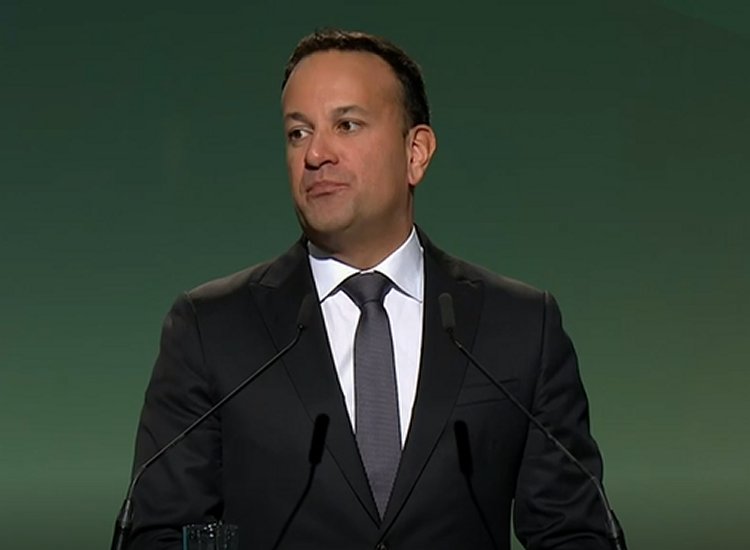
Taoiseach Leo Varadkar has argued that Ireland can become energy independent within a generation or less and that that generation should be the ones to reverse climate change and biodiversity loss.
Varadkar today unveiled the government’s updated National Climate Action Plan, saying we must prepare for the negative impacts of climate change.
He said this plan shows the way forward and will guide the government’s efforts in the years to come.
Measures announced today include:
– Enough renewable electricity to power every home and business in the country by 2030
– 70% of people in rural Ireland have buses going to the nearest town three times a day
-500,000 houses adjusted to BER B2 to make them warmer
-One in three private cars on our roads will be electric by 2030
-Walking, cycling and public transport account for 50% of all daily trips
-Plow up to 400,000 hectares by 2030
The plan also includes a climate action roadmap for each economic sector, consistent with the legally binding target of reducing greenhouse gas emissions by 51% by 2030.
Varadkar said Ireland is at a “moment of real opportunity for our country and for the planet”, reports RTE.
He said climate change is “the most pressing long term global challenge of our time” and Ireland is addressing that challenge.
“We should not see climate action as an obligation or a burden. We should embrace it as an opportunity,” the Taoiseach said, reports RTE.
“Three Ecological Crises”
Environment, Climate, Communications and Transport Secretary Eamon Ryan said the biggest challenge over the next decade is what Ireland is doing collectively as a country to tackle climate change.
He said Ireland is facing three ecological crises – climate, biodiversity loss and pollution – and there must be radical changes.
“But we can and will be good at this. Our potential to be climate leaders is huge and now we need to ramp up our ambition,” reports RTE.
He said it was the responsibility of ministers to show key economic sectors and industries they were “on track” to halve emissions by 2030 and reach net-zero by 2050.
Describing transport as arguably ‘the most challenging’, he warned that Ireland now needs to make a breakthrough that will see the entire state take a different direction towards sustainable mobile transport systems.
This, he said, would avoid unnecessary transport, which is the first step in the right direction.
“Blueprint for radical change”
Tánaiste Micheál Martin described the plan as a plan for radical change that will ensure a prosperous and sustainable future.
He said the government will “continue to provide strong leadership” and that ministers are now legally responsible for ensuring each sector is equipped and supported to achieve the emission reductions it demands.
“Achieving our objectives on climate change is a national endeavour that will require a positive, sustained engagement from people across all communities,” he said, reports RTE.
Farming reaction
Meanwhile, the Farmers Association of Ireland said further cooperation with farmers is needed to ensure emissions can be reduced while facilitating the sustainable development of Irish agriculture.
“The world needs more food and Irish farmers are well placed to produce food in an environmentally efficient manner,” said IFA president Tim Cullina, reports RTE.
Cullinan said the debate should be about reducing emissions, not livestock.
“The Government could do real damage to our sector to meet a short-term target when technological advancements could well help us achieve our 2030 targets…and it needs to invest in research and development to activate these technologies,” he said, reports RTE.
The Irish Creamery Milk Suppliers Association said the climate protection plan “the marginal over the substantial”.
ICMSA President Pat McCormack said attempts by farmers to grapple with where to get emissions cuts are being hampered by the government’s failure to define the nature of the task and denial of the necessary funding.
“We have a continuous stream of policy that keeps doubling down on a relatively insignificant organics sector while completely ignoring the live stock sector, most specifically the family farm dairy sector, without which it will be simply impossible to get the numbers and momentum required to make this transition work,” he said, reports RTE.
The Irish Cattle and Sheep Farmers’ Association said the plan had “long on aspiration and short on specific funding strategies”.
Last July, the government set extremely ambitious and legally binding greenhouse gas emission reduction targets for every sector by 2030.
For example, electricity emissions must be reduced by 75%; 50% freight; residential buildings by 40%; and agriculture by 25%.
But there was a lack of detail and a clear roadmap on how to achieve these goals.
The updated climate protection plan will at least provide a little more clarity.
Tell us your thoughts in the Facebook post and share this with your friends.


